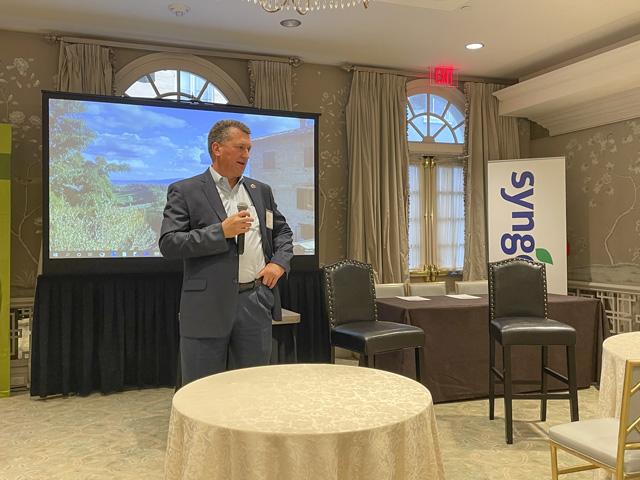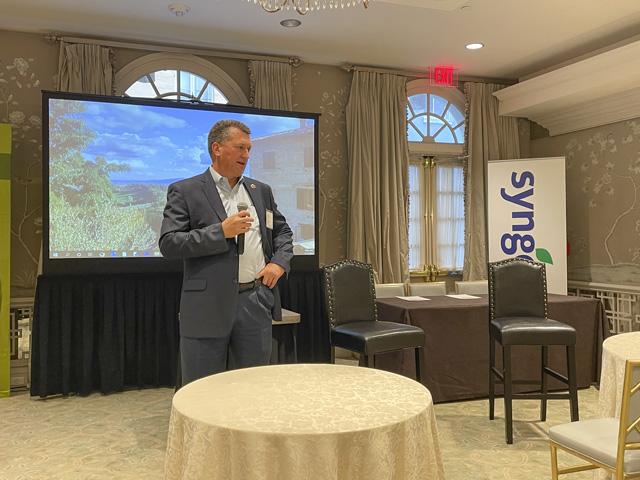Production Blog
Syngenta's President of Crop Protection Provides Product Insights
NEW ORLEANS (DTN) -- Securing certain herbicides may be a challenge for farmers in 2023 like this year and crop protection products will likely cost more, according to Vern Hawkins, Syngenta crop protection president. Hawkins discussed supply chain issues and other topics important to growers at the recent Syngenta Media Summit in New Orleans.
Hawkins also talked with DTN about ongoing litigation involving the company that may or may not affect growers in the future, new products and other issues. The bi-annual media event was held on Oct. 31 to Nov. 1. It included a tour of Syngenta's main crop protection manufacturing and packaging plant in St. Gabriel, Louisiana, where products such as atrazine are produced.
Here's Hawkins' one-on-one interview with DTN (Editor's note: Some statements have been edited for brevity and clarity.). To watch the full interview, go to https://www.dtnpf.com/….
DTN: What would you like farmers to know about 2023, especially when it comes to crop protection product availability?
Hawkins: 2023 is going to be another year of challenges. I think there will be improvements in some of the product supply situations, but a number of the products are still constrained. We've been working hard with our retail partners to make sure that we have good customer forecasting plans related to intentions. I think farmers certainly need to be connected with their suppliers so those needs are understood ... to make purchases on time frames that make sense for farmers. There are a number of things that are freeing up in parts of the logistics supply chain as far as some (herbicide) components, but there are still a number of components that are quite tight, which is making it difficult to make some products in advance of the season.
P[L1] D[0x0] M[300x250] OOP[F] ADUNIT[] T[]
DTN: What type of crop protection products are you talking about? What chemicals may farmers want to get locked up?
Hawkins: It's a little bit difficult to pin it to a specific product. But we certainly know of some supply constraints in some of the corn herbicide chemistry areas due to a raw material needed by all suppliers. What we need most from farmers is to understand their (herbicide use) intentions because we can still influence the mix of where those active ingredients get put into end products. We have a certain amount of active ingredients ... to make (products) that farmers are planning to purchase. That's a big part of our supply chain planning, which is underway right now.
(Hawkins said during the Media Summit that raw materials to make chloroacetamide herbicides, Group 15 products with the active ingredients metolachlor, acetochlor and alachlor, have been difficult to obtain. This could include brand names Acuron, Dual II Magnum and more.)
DTN: What should farmers expect as far as pricing for crop protection products in 2023 and beyond?
Hawkins: Pricing is going to continue to go up in 2023. It will be quite broad depending on the product, but generally it could be as high as single digits or near 10%. I think many farmers probably have already seen that. The largest reason is input costs for raw materials have increased in price. Logistics is still quite expensive as well. I do hope that as we go through 2023 into '24, we'll begin to see some of that (high costs) subside.
DTN: Can you talk about litigation challenges Syngenta faces and how that may or may not affect farmers? (The Federal Trade Commission (FTC) and 10 states recently filed a complaint against Syngenta Crop Protection and Corteva Inc. alleging the companies paid distributors to block competitors from selling less-expensive generic products to farmers as part of their loyalty programs. Read a DTN story about the suit at www.dtnpf.com/agriculture/web/ag/crops/article/2022/09/29/ftc-state-ags-sue-syngenta-corteva. Syngenta also faces lawsuits from farmers, ag workers and others claiming they developed Parkinson's disease as a result of exposure to paraquat. Syngenta denies claims made in both lawsuits.)
Hawkins: Litigation often takes some time to work its way through to a decision point. We did experience a complaint filed by the FTC, related to one of the small (loyalty) programs that we offer, which we've been doing for 20 years. We don't think there's any merit (based on) the facts and the law. We chose to write a letter to our retail partners to explain our position, largely because the FTC published an op-ed in the Des Moines Register, making claims that the price of food is impacted by our loyalty program. We just made a statement to say the case has no merit, we're going to defend ourselves and we'll continue to supply our products. We wanted farmers to know the rest of the story. (See the letter at https://www.dtn.com/…)
Paraquat is a product that's been in litigation for a couple of years now. You've probably seen a lot of advertisements from trial lawyers trying to drum up business. This is a product that we have very good science on, we've been selling it for decades as well. We're going through the process of refreshing a lot of our data, looking at the Parkinson's (disease) incident rate for plant workers versus the general population. All of the data is very supportive of our position. We've got to defend the science and that's what we're prepared to do.
DTN: Farmers are always wondering when a new herbicide mode of action will be coming. What's in the pipeline for Syngenta?
Hawkins: Fortunately, we have a very good pipeline. We've got a new insecticide coming, which is the segment that we're least represented in in the U.S. We have a couple of new mode-of-action herbicides being developed, which is very important to U.S. farmers. They are over five years away. But I've personally seen this year their efficacy and the crop safety of those technologies. It's very good. We've got to go through all the toxicological and environmental profiling, and we hope that that goes well. We're investing in the future on behalf of the American farmer. We know the American farmers' commitment to innovation is high and they'll always be relevant in our strategy.
Matthew Wilde can be reached at matt.wilde@dtn.com
Follow him on Twitter @progressivwilde
(c) Copyright 2022 DTN, LLC. All rights reserved.






Comments
To comment, please Log In or Join our Community .